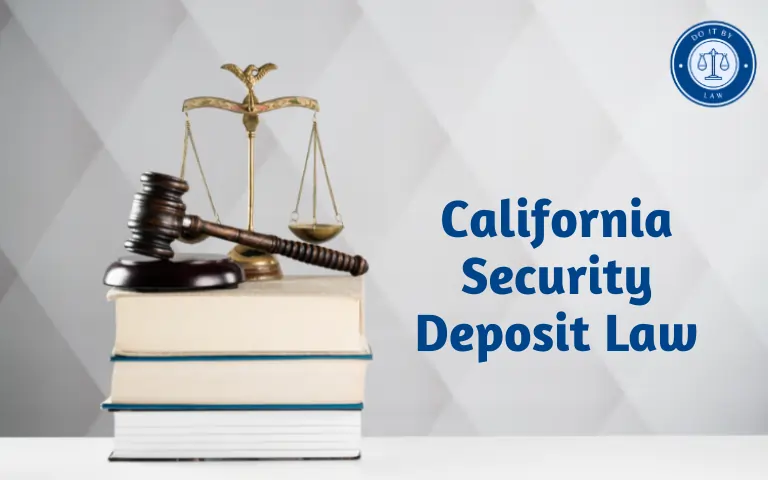California Security Deposit Law: What You Need to Know
The California security deposit law regulates security deposits that tenants pay to landlords when renting residential property. It covers the maximum allowable deposit, handling and return of deposits, penalties for violations, and more. Understanding this important renter’s protection is key for both California tenants and landlords.
When the California Security Deposit Law Was Enacted and Why It Exists
The California State Security Deposit law, officially known as California Civil Code Section 1950.5, was added in 1970 to protect tenant rights and restrict landlord abuses regarding rental deposits.
Before 1970, there were few legal protections for tenant security deposits in California. Unscrupulous landlords would often make excessive or unfair deductions from deposits when tenants moved out. In some cases, deposits were not returned at all.
To remedy this and standardize security deposit rules statewide, Assembly Bill No. 925 was introduced and signed into law in 1970 as Section 1950.5 of the Civil Code. This established statewide legal procedures and requirements around security deposits to balance the rights of landlords and tenants.
The basic intent of the law is to:
- Limit the maximum allowable security deposit amount landlords can charge
- Prevent landlords from taking unfair deductions from deposits
- Ensure tenants receive their deposit money back promptly after moving out
- Provide penalties to landlords who violate security deposit rules
By regulating security deposits in this manner, the law provides important financial protections for California residential tenants renting apartments, houses, duplexes, condos, and other rental units statewide.
Who California Security Deposit Law Applies To
The provisions of California Civil Code Section 1950.5 apply to landlords and tenants in residential rental scenarios throughout California. This includes:
- Apartments
- Houses
- Condominiums
- Duplexes
- Room rentals
- Most other standard residential dwellings
It does not apply to lodgers, commercial property rentals, recreational vehicle park rental agreements, or other scenarios outside standard landlord-tenant arrangements.
In basic terms, the law applies anytime a California tenant pays a refundable deposit to a landlord to rent a home to live in. The landlord must then follow all legal requirements around properly handling that deposit money.
Key Provisions of California Security Deposit Law
California security deposit law contains several specific provisions that govern how security deposits work in California rental housing, including:
Maximum Security Deposit Amount
- Landlords cannot charge more than 2 months’ rent for an unfurnished unit or 3 month’s rent for a furnished unit as a security deposit. Local rent control ordinances may further limit deposit amounts in some cities.
Handling and Records
- Deposits must be held in a federally insured interest-bearing account in California.
- Landlords must provide annual records of deposits held by the tenant.
- Deposits cannot be non-refundable.
Returns and Deductions
- Deposits must be returned within 21 calendar days after the tenant moves out.
- Allowable deductions include unpaid rent/damages beyond normal wear and tear. The burden of proof is on the landlord.
- Tenants must provide a forwarding address to receive deposit returns.
Penalties and Remedies
- It is illegal for a landlord to simply keep a deposit without justification.
- Tenants can recover up to 2x the full deposit amount in court if the landlord retains a deposit in bad faith.
The law contains additional stipulations around security deposit transfers upon sale of rental properties, move-out inspection requirements, and other details landlords must follow.
Penalties for Violating California Security Deposit Law
If a landlord fails to follow the security deposit rules and timelines explained above, the law allows tenants to file legal claims to recover damages. Key penalties under Civil Code 1950.5 include:
- Failure to return the deposit within 21 days after the tenant provides a forwarding address can result in the tenant legally recovering the full deposit amount PLUS up to 2 times the deposit amount in damages.
- Improper deductions from the deposit above normal wear and tear allow the tenant to recover up to 2 times the deduction amount.
- Bad faith retention of any portion of the deposit allows for recovery of up to 2 times that amount.
- If the landlord failed to provide proper annual records of deposit activity as required, they lose the right to make any deductions at all.
Beyond financial penalties, landlords can also face additional civil penalties for willful ignorance or fraud. Tenants have up to 4 years from the end of the tenancy to file legal claims related to security deposit issues.
With multiple penalties on the line for deposit violations, landlords must strictly adhere to the law’s many specific requirements to avoid significant legal trouble.
Recent Changes and Proposed Changes to California Security Deposit Law
While California Civil Code 1950.5 has remained largely unchanged since its inception in 1970, there have been some minor updates:
- In 2012, Assembly Bill No. 2303 clarified procedures around security deposits when rental properties change ownership. Requirements for the transfer of deposits to the new owner were standardized.
- In 2018, Proposition 10 proposed repealing the limits on maximum allowable deposits. After extensive debate on both sides, Prop 10 did not pass, leaving deposit caps unchanged.
- In 2021, Assembly Bill No. 832 clarified that landlords must permit tenants to be present for initial move-out inspections used to assess potential deposit deductions. This strengthened tenant rights in the security deposit return process.
Looking ahead, several amendments to strengthen tenant rights have been proposed in recent years but not yet enacted, including:
- Eliminating non-refundable fees that essentially act as “disguised security deposits”.
- Requiring deposit returns within 10 days instead of 21 days.
- Mandating treble (3x) damages instead of double damages when landlords unlawfully retain deposits.
Controversies, Debates, and Challenges With California Security Deposit Law
While tenant advocacy groups strongly support the protections provided by Civil Code 1950.5, some landlord groups have critiqued portions of the law over the years. Key ongoing debates include:
- High Penalties: Landlords argue that technical mistakes can too easily lead to severe statutory penalties around deposit returns. Tenant groups counter that this motivates proper legal compliance.
- Move-Out Inspections: Many landlords want move-out inspections to definitively establish the basis for deposit deductions instead of needing to prove them afterward. However, some tenants cannot accommodate scheduling constraints.
- Non-Refundable Fees: Landlords want flexibility to charge non-refundable move-in fees like cleaning and administrative fees not considered part of the deposit. Tenants argue these are “disguised deposits” that should be regulated and refundable.
- Record Keeping: While relatively straightforward, some smaller landlord operators struggle with properly tracking and documenting annual deposit accounting records as required.
These core areas of disagreement indicate where future amendments around California security deposit rules are most likely to materialize as landlords and tenant advocates clash on finding the right balance. However, the basic framework established by Civil Code 1950.5 has persisted largely unchanged for over 50 years due to its broad effectiveness.
Conclusion and Key Takeaways on California’s Security Deposit Law
In review, all California residential landlords and tenants must understand and carefully follow the numerous provisions around security deposits contained in California Civil Code 1950.5. Key takeaways include:
- The law sets limits on maximum allowable deposits landlords can charge tenants when renting living spaces.
- Specific handling, accounting, return, and deduction rules must be strictly followed under statutory timelines.
- Tenants have extensive remedies if landlords mishandle deposits, including double or triple financial damages.
- With high penalties on the line, landlords must ensure full legal compliance when managing tenant deposits.
- Understanding California security deposit best practices allows both tenants and landlords to smoothly navigate tenancy start and end.
By safeguarding tenant deposit money and limiting abuse, California’s robust security deposit law establishes standardized statewide expectations and helps avoid conflicts when tenancies conclude. Both rental housing providers and renters in California can use Civil Code 1950.5 as an invaluable reference when navigating critical deposit issues.






